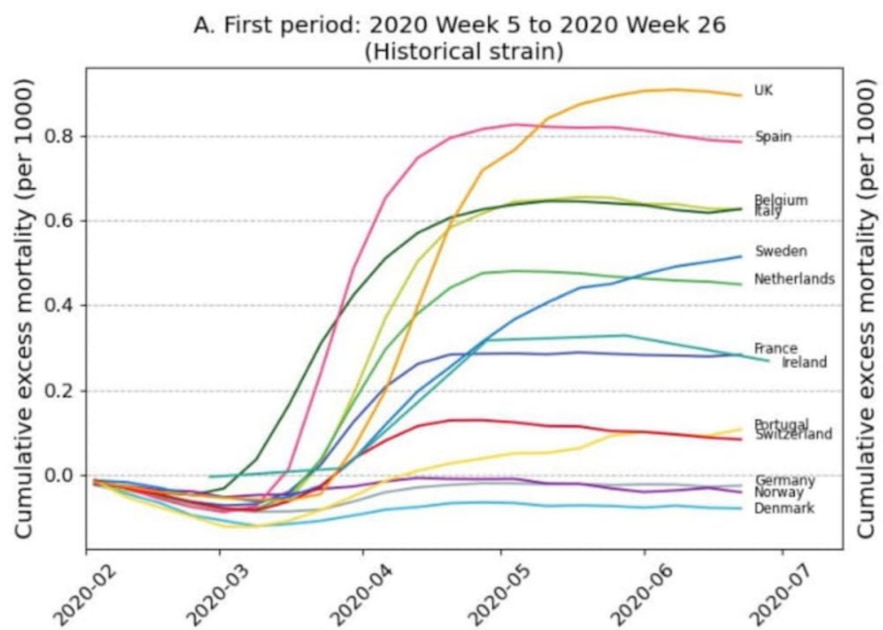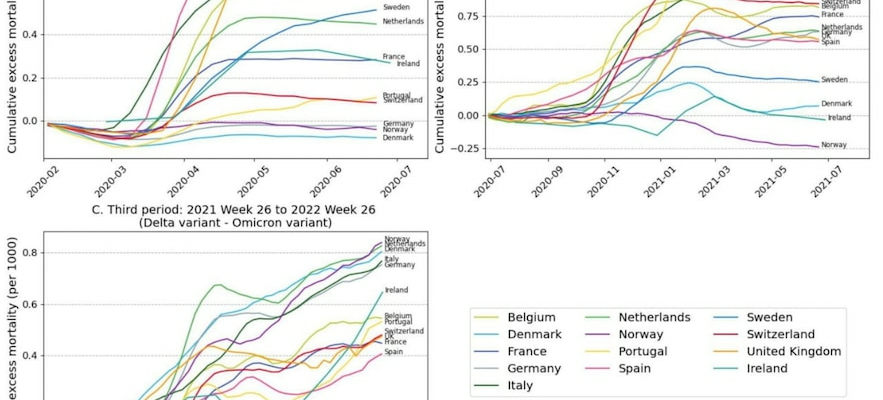The Covid-19 crisis may be over, but the threat of a future pandemic has not yet been ruled out. The concerns of epidemiologists around cases of H5N1 avian flu in the United States or dozens of deaths caused by an “unknown disease” in the Democratic Republic of Congo remind us of this. And the consequences can be dramatic, as numerous studies have demonstrated. It was thus estimated that the Covid-19 pandemic resulted, between 2019 and 2021, in excess mortality of 14.9 million deaths worldwide, including 750,000 in Western Europe. The loss of economic output is expected to reach 12.5 trillion dollars (11.8 trillion euros) by the end of 2024. How to deal with a future pandemic, what are the most effective ways to save lives and our economies? A study published this Monday, December 9 in the journal BMC Global and Public Health aims to answer these questions.
This work, carried out by the Pasteur Institute in association with around forty European scientists – all involved in managing the Covid-19 crisis in their countries – compares the effectiveness of strategies implemented in 13 European states. ‘West. The authors draw several lessons: first, that the sooner governments put measures in place – isolations, confinements, rapid deployment of vaccines for the most vulnerable – the more people they saved and the better they preserved their economy. Then, it is necessary to have a surveillance system capable of quickly identifying the circulation of a virus and its hospital impact. If these conclusions appear obvious, this work has the merit of confirming what previous studies have already demonstrated with even more solid evidence than before. They also make it possible to sweep away certain beliefs, such as the supposed effectiveness of Swedish policy during the first wave, or the idea that we can protect the economy by delaying binding decisions.
The Danish example, the Boris Johnson counter-example
To reach these conclusions, the authors studied excess mortality during the pandemic in 13 European countries: Germany, Belgium, Denmark, Spain, France, Ireland, Italy, Netherlands, Norway, Portugal, United Kingdom, Sweden and Switzerland. To do this, they calculated the average trend in mortality in each of these countries between 2010 and 2019. They thus obtained the mortality that could have been expected without the Covid-19 pandemic between 2020 and 2022 and the compared to the mortality actually observed. “The advantage of basing ourselves on excess mortality – all causes – is that we had data available for all Western European countries with great precision,” explains Arnaud Fontanet, director of the unit. epidemiology of emerging diseases at the Institut Pasteur and co-author of the study. We were therefore able to carry out a temporal analysis week by week, by age group and sex.
The researchers then standardized the age and sex of the populations of Western Europe in order to take into account, for example, the fact that the proportion of people over 80 – particularly vulnerable to Covid-19 – is twice as important in Italy as in Ireland. They then measured this excess mortality during three periods: from January to June 2020 (the first wave) then from July 2020 to June 2021 (the autumn waves followed by the spread of the Alpha variants) and from July 2021 to June 2022 (the Delta and Omicron waves).
First observation: over the first two years of the pandemic, with an excess mortality of 2.7 deaths per 1,000 inhabitants between 2020 and June 2022, Italy is, by far, the country with the worst record, even in taking into account its particularly elderly population. Next come Belgium, the United Kingdom, the Netherlands, Portugal and Spain, which are between 1.7 and 2, then France, Switzerland and Germany, between 1.3 and 1.5 . Ireland, Denmark and Norway obtain the best results, with excess excess mortality between 0.5 and 1 death per 1,000 inhabitants, just like Sweden which ended up taking appropriate measures after the failure of the strategy. adopted during the first wave.
A. From January 27, 2020 to June 28, 2020 (historical strain). B. From June 29, 2020 to June 27, 2021 (historic strain, then predominance of the Alpha variant). C. From June 28, 2021 to July 3, 2022 (predominance of the Delta variant, then predominance of Omicron and its sub-variants).
© / Galmiche et al. BMC Global and Public Health
But the authors of the study above all wanted to analyze the impact of decisions taken at the very beginning of the epidemic. “All countries, except Sweden, took strong decisions during the first wave [NDLR : confinements, fermetures des bars et restaurants, isolements, etc.]recalls Professor Fontanet. We therefore measured the weekly hospital admission rate at the time these measures were applied: the lower these rates were, the more it indicated that the country reacted quickly. They then compared these results with the excess mortality of the first wave.
“The case of Denmark is particularly interesting, since they took strong decisions while their hospitals were still empty – there were only 10 people hospitalized, some without severe form,” explains Professor Fontanet. Result ? They obtained a negative excess mortality during this period, which can be explained by the fact that their measures were not only effective against Covid-19, but also against the flu, which kills thousands of people each year.

Cumulative excess mortality standardized by age and sex in 13 Western European countries from January 27, 2020 to June 28, 2020 (historical strain).
© / Galmiche et al. BMC Global and Public Health
The United Kingdom, which was the country which locked down the latest in Europe – only on March 23, under the pretext of preserving its economy – found itself with the highest excess mortality. “England wanted to postpone its confinement by a week, they paid dearly for it, while the countries which reacted very early had lower mortality,” notes Professor Fontanet. France finds itself in the middle of the table, with an excess mortality of only 0.3 while our country was not the quickest to implement confinement, which can be explained by the fact that only the Grand Est, Hauts-de-France and Ile-de-France were severely affected during the first wave. Likewise for Italy, which had been hit mainly in Lombardy.
The case of Sweden is also interesting, since during the first wave, the Scandinavian country relied on a policy aimed at letting the virus circulate. “We can clearly see on the graph that their excess mortality has gradually increased, until it is around 80% higher than France,” underlines the researcher from the Pasteur Institute. At the end of 2020, the King of Sweden and the Prime Minister officially apologized and the authorities completely changed their policy, imitating Norway and Denmark, this time with great success. “The idea of flattening the curve by letting the virus circulate so as not to have a rebound effect while protecting the elderly could be understood at the time, but in practice, it did not work at all. worked and they were forced to take stronger measures,” analyzes the French researcher.
Early measures do not kill the economy
The authors of the study also analyzed the economic consequences of the measures put in place. During the pandemic, many politicians, like Boris Johnson in the United Kingdom or Donald Trump in the United States, claimed that the implementation of strong measures would kill their country’s economy. “This time again, we compared hospital admissions at the time the decisions were applied and the drop in GDP in 2020,” explains Professor Fontanet. The observed trend is that the countries which confined the latest had the greatest drop in GDP. England is, for example, at minus 10%. The countries which found themselves with saturated hospitals, such as Italy, Spain – and England – are those which have suffered the greatest deterioration in their economy. The second message of this study is therefore that in addition to saving more people, the early implementation of measures allows us to preserve the economy.
The authors readily acknowledge the limitations of their study. Thus, external factors – such as Brexit in the United Kingdom – are not taken into account. “On the other hand, it is very unlikely that the implementation of late measures could lead to a preservation of GDP, points out Professor Fontanet. We therefore have, at a minimum, no argument to affirm that taking early decisions kills the economy, and we rather want to think the opposite”. The authors also measured the impact of people’s trust in their governments. Unsurprisingly, they found that the more people had confidence, the more they followed the measures and the more effective they were.
“What we show in our study is not revolutionary, it is even obvious, but it was important to document this obvious nature with solid data, underlines Professor Fontanet. And if we experience a new pandemic – I “Hopefully it won’t be H5N1 – we need to know what the most effective strategies are: anticipate hospitals being put under pressure and take measures before that happens.” The other advantage of acting quickly is to adapt the response more easily, softening them if the situation improves or toughening them if it worsens. The authors therefore recall the importance of surveillance tools, such as monitoring hospitalizations and analyzing wastewater. It remains to be seen whether populations would be ready to face sacrifices such as strict confinements again. “This is a point of concern,” recognizes Professor Fontanet. But the solutions are now known and documented.
.
